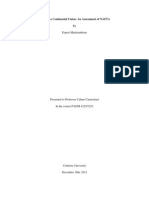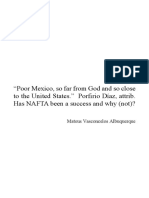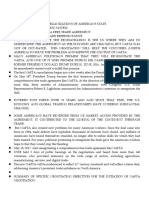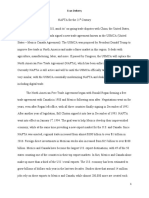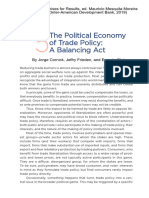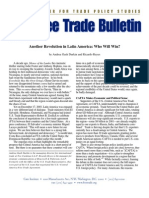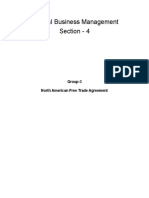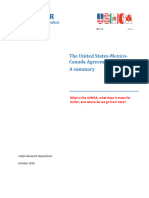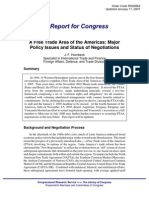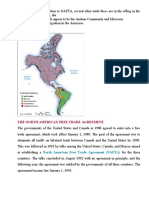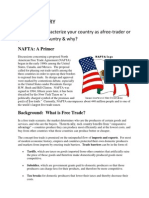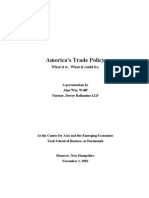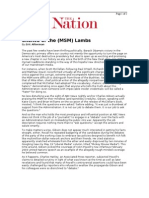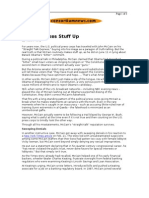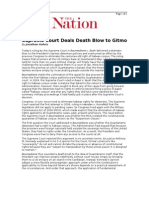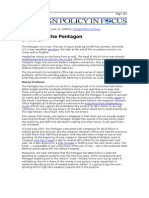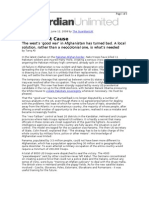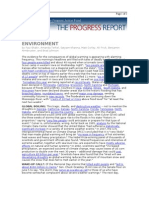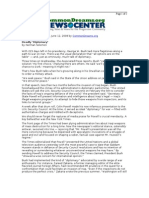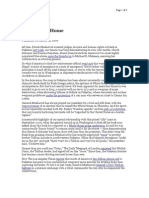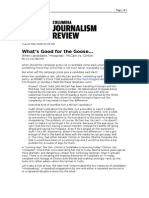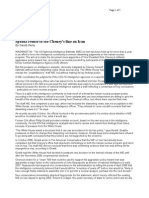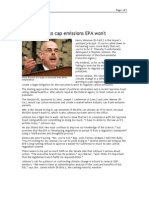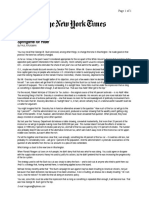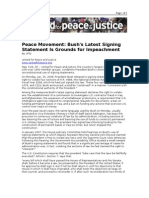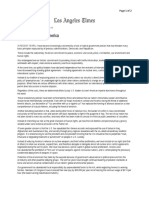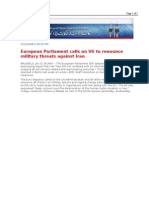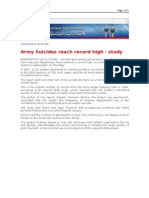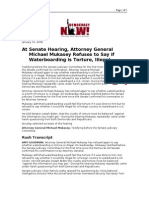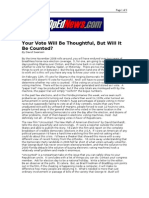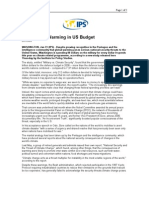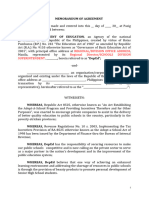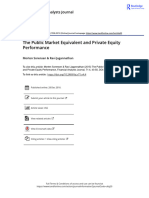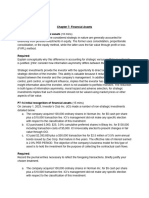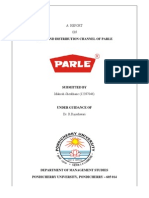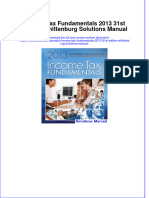01-09-09 FPIF-Obama and NAFTA Laura Carlsen
01-09-09 FPIF-Obama and NAFTA Laura Carlsen
Uploaded by
Mark WelkieCopyright:
Available Formats
01-09-09 FPIF-Obama and NAFTA Laura Carlsen
01-09-09 FPIF-Obama and NAFTA Laura Carlsen
Uploaded by
Mark WelkieCopyright
Available Formats
Share this document
Did you find this document useful?
Is this content inappropriate?
Copyright:
Available Formats
01-09-09 FPIF-Obama and NAFTA Laura Carlsen
01-09-09 FPIF-Obama and NAFTA Laura Carlsen
Uploaded by
Mark WelkieCopyright:
Available Formats
Page 1 of 3
January 9, 2009
Obama and NAFTA
Laura Carlsen
Foreign Policy In Focus
Will he or won't he?
In the shadow of the economic crisis, a war of words rages over whether President-elect Barack Obama will hold to his
campaign promise of opening up the North American Free Trade Agreement for renegotiation.
The debate isn't likely to stay in the shadows for long. Campaign attacks on NAFTA and candidate promises to renegotiate
proved that demands for revision of the free-trade model have reached critical mass in U.S. politics. A post-election report from
Public Citizen’s Global Trade Watch heralded a net gain of 28 fair-trade members in the House and seven senators. Most of
these politicians, it notes, didn't just happen to be critical of the free-trade model. They actively ran on a fair-trade platform and
won partly on that stance.
The economic crisis only strengthens those demands. If international trade and investment policy is the pillar of the current
economic model, its revision must be a foundation of global restructuring plans.
Why renegotiate NAFTA?
The mainstream press is wrong when it says the United States can’t "unilaterally" call for renegotiation. Not only is
renegotiation permitted legally — in fact, any country can unilaterally withdraw with six months notice — but there have been
many calls for renegotiation in Canada and Mexico.
Canadians have built a strong grassroots movement to protect natural resources from predatory NAFTA clauses. Broad-based
citizen groups like the Council of Canadians oppose NAFTA because of the energy proportionality clause that requires Canada to
export oil to the United States even in times of scarcity, the investor-state clauses that give investors the right to sue
governments contained in Chapter 11, and the clause that permits bulk-water exports. Polls in the general population show
that 61% favor renegotiation.
In Mexico, 100,000 people marched in the streets on two separate occasions under the banner of renegotiation to revise
NAFTA’s agricultural provisions. They demanded protection of basic food production by removing corn and beans from the
agreement. In 2003, former President Vicente Fox requested opening up the agreement only to be rebuffed by the U.S.
government.
For the United States, the main issue is jobs. Senator Sherrod Brown, an Ohio Democrat, cites a loss of 200,000 manufacturing
jobs due to NAFTA for his state alone. The nation has lost 3.1 million manufacturing jobs since 1994, and its trade deficit with
Mexico and Canada has risen to $138.5 billion in 2007 from $9.1 billion in 1993. The opposition to NAFTA within the United
States goes well beyond organized labor. While job loss and insecurity under globalization were major constituency-builders in
blue-collar states during the elections, polls taken before the election revealed that a national majority opposes free trade and
particularly NAFTA, and that opinion increased during the campaign. A June 2008 Rasmussen nationwide poll showed 56% in
favor of renegotiating NAFTA. Many people feel that NAFTA has given companies incentives to move production to where labor
is cheaper, exporting jobs and eroding working conditions.
In general, U.S. opposition to the trade agreement is split between fair-trade groups that focus on jobs and the environment
and a nationalist rightwing that believes NAFTA and its offspring, the Security and Prosperity Partnership, threaten U.S.
sovereignty. Neither of these currents could properly be called "protectionist," and both call for more transparency in the
process.
Among the differing priorities, citizen demands concur that the current agreement favors transnational companies and is unfair
to citizens in all three nations.
Page 2 of 3
Broadly shared priorities for renegotiation are:
Eliminate Chapter 11. Corporations shouldn’t have the right to sue governments and supersede national laws. Trade
tribunals lack adequate transparency and accountability, and consistently reflect a strong, pro-corporate bias.
End the energy proportionality clause between the United States and Canada, and exclude bulk water as a
commodity. Canadian national and provincial governments should be able to fulfill their responsibilities in long-term
energy planning without restrictions under NAFTA.
Get NAFTA out of food and agriculture. Countries should be able to develop national agendas to assure food quality,
farm livelihoods, and consumer safety and then adapt the trade agreement to those objectives rather than the
reverse. NAFTA favors corporate farms and bans certain policy tools to support small farmers and consumers,
including special products protections. Renegotiating the agreement’s agricultural provisions shouldn’t involve
surgical incisions of specific clauses, but a deep reform and reorientation toward food sovereignty.
End the Security and Prosperity Partnership. This 2005 NAFTA extension into further trade and investment
liberalization and national security has no public mandate in any of the three countries. Further negotiations on
expanding integration should be reviewed and, where approved, be channeled into open, representative talks. The
U.S. military aid package it spawned, the Merida Initiative, should be converted into a development aid package for
the 2010 appropriations.
Citizen movements also call for national governments to have more development and social policy tools, many of which are
prohibited under the competition and privatization terms of NAFTA. Some of these groups together produced a document of 10
areas that should be reviewed: energy, agriculture, role of the state, financial services, foreign investment, employment,
migrants, environment, intellectual property, and dispute settlement.
Will He or Won't He?
Obama's campaign promise was explicit: "NAFTA's shortcomings were evident when signed and we must now amend the
agreement to fix them." The president-elect called for enforceable labor and environmental standards in the text, an end to the
ability of corporations to sue governments, and emphasizing the needs of "Main Street" over "Wall Street."
But now some Obama-watchers claim he's waffling on his trade commitments. Although these contentions in the pro-free-
trade press are mostly wishful thinking, experts and activists are following the appointments closely. So far it has been a mixed
message. The initial nomination of Bill Richardson, point-person for the passage of NAFTA under the Clinton administration,
didn't sit well with fair-trade groups and elicited a sigh of relief among free-trade promoters, who instantly chalked up the
president-elect's anti-NAFTA statements to electoral propaganda. Obama's economic advisors, led by Larry Summers, and
appointee for Treasury, Timothy Geithner, at face value would also indicate a commitment to the status quo on trade. And
when Ron Kirk, a former mayor of Dallas who proclaimed his city the "capital of NAFTA," accepted the nomination for U.S.
Trade Representative, it reversed satisfaction among fair-traders at the initial nomination of Xavier Becerra, who turned down
the job.
Pending the new Commerce designate, that leaves Hilda Solis, Obama’s nominee for Secretary of Labor, as the only real bright
spot for fair-traders. A NAFTA critic, she would wield real clout since jobs will be the pivotal issue for the United States in
renegotiation. As a Latina, she also has an acute understanding of the need to make NAFTA fair for all partners.
Pessimistically, it’s possible to imagine that the Obama presidency could end up merely adopting the Democratic platform on
trade, which would stick side agreements in the text, add International Labor Organization core labor standards, and create an
expanded U.S. jobs displacement program. Obama voted for the U.S.-Peru Free Trade Agreement, which was modified along
these lines. But the economic crisis has changed everything. Even as the Bush administration frantically — and incredibly —
insists that free trade isn't the problem but the solution, most other countries are taking a second look at the model. As the
crisis sets in, Europe wants more regulation and developing countries want more policy space. And Americans want more
protection from the disaster that's currently befalling them.
With every appointment, Obama has insisted he'll be the one calling the shots. For the next few weeks, then, all we really have
to go on for predicting trade policy is Washington's current favorite game — the psychic exploration of Obama's inner mind. A
more productive activity for fair-traders is to pull out all the stops in the tri-national campaigns to renegotiate NAFTA and
impose a moratorium on new free trade agreements. This is an historic opportunity to change course in crisis.
Citizens Organize for Renegotiation
Citizen organizations and legislators have called for renegotiation of NAFTA in the United States, Canada, and Mexico. The
collapse of the financial sector spells the need for a reconversion strategy for the "real economy;" that is, U.S. productive
Page 3 of 3
capacity in the United States. This strategy will require a careful and critical look at NAFTA, our blind reliance on market forces,
and the promotion of outsourcing as a competition strategy.
The industrial policy that Obama outlined clashes ideologically and legally with NAFTA and other free trade agreements. It
hasn't been lost on the rest of the world that the U.S. government is adopting measures such as massive subsidies and bailouts
that it has sought to deny developing countries under free-trade rules. Robert Kuttner at The American Prospect refers to this as
"the sin of committing industrial policy" and warns that it's only a matter of time before a trade partner registers a suit against
Obama's anti-crisis measures. This would be an excellent opportunity to expose the hypocrisy of our trade policies and chart a
new course.
The new fair-trade members of Congress and others outside the leadership clique will provide new allies and be far more
willing to move beyond the stodgy party leadership's position on trade. Some already have. The TRADE Act, introduced into
Congress in April 2008, calls for a NAFTA review and lays out fair-trade principles.
Meanwhile, poor countries need maximum room for maneuver to help those who are already living on the edge. Mexico is no
exception. Although the current government isn’t likely to willingly change neoliberal policies and accept NAFTA renegotiation,
the citizenry opposes NAFTA two to one. Echoing the phrase that did in John McCain's candidacy, President Felipe Calderón
continues to argue that the Mexican economy will be fine even as reports of job loss, wage declines, inflation, and capital flight
pour in. In Mexico, as in the United States, only energetic measures can address the deepening crisis and growing social unrest.
Renegotiation can and should be good for citizens in all three countries. With such a high degree of integration, our futures are
intertwined. A recent study calculated that when Mexican wages drop 10% relative to U.S. wages, attempts to cross the border
illegally rise 6%. Real wages in Mexico fell 24% from December 2006 to August 2008 and are plummeting now with the crisis;
renegotiation should include a view toward job generation and retention in Mexico, and a compensation fund similar to the
European Union's transition funds for less-developed countries. The current security aid in the ill-conceived Merida Initiative
should be converted to this end.
Review and Redo
The first step for renegotiation must be a broad, in-depth review of NAFTA, or rather three reviews, one per country. Review
bodies must be independent, representing different orientations and expertise. These should carefully define the criteria of
evaluation, including social, economic, political, and cultural indicators. The U.S. TRADE Act, which also calls for a review, lists
some criteria for evaluation, but we need precision. Also necessary are public consultations and other mechanisms for
incorporating civil society input into the process.
The review would achieve several important goals. First, it would open up a debate that in the United States had been
practically dormant between NAFTA's passage and the recent presidential campaign. It also would provide valuable information
on impacts. The apples-and-oranges debate on trade policy — one side argues that NAFTA increased international trade and
the other argues that international trade isn't all it's cracked up to be — is sterile and abstract. We should be able to move
beyond this debate with additional data and analysis.
To convince public opinion of the case for renegotiation, at this critical moment in a process of economic integration gone awry,
will require thinking about international trade and investment in the context of new economic arrangements. To do this we
need to build both arguments and alliances. Renegotiation demands must be woven into comprehensive proposals for reform
that have a coherent logic and go beyond NAFTA articles. Related issues include enforcing antitrust legislation, ending
commodity speculation, adopting supply management mechanisms, creating grain reserves, supporting domestic food
production, and building local marketing systems.
Renegotiating NAFTA should no longer be a question of "will he or won't he." To confront the crisis and establish mutual well-
being in the region, the debate must move quickly now to "how and when."
Laura Carlsen (lcarlsen(at)ciponline.org) is director of the Americas Policy Program (www.americaspolicy.org) in Mexico City,
where she has been an analyst and writer for two decades. She is also a Foreign Policy In Focus columnist.
You might also like
- Nafta Primary SourcesDocument3 pagesNafta Primary Sourcesapi-24619844550% (2)
- Meyerson 2005-Mar-30 CAFTA and Medicines (WaPo)Document2 pagesMeyerson 2005-Mar-30 CAFTA and Medicines (WaPo)ashakow8849No ratings yet
- A Study of North American Free Trade AgreementDocument6 pagesA Study of North American Free Trade Agreementparthjoshi552No ratings yet
- Building A Continental UnionDocument13 pagesBuilding A Continental UnionEspoir Love ManirambonaNo ratings yet
- NAFTA and The Mexican Economy: A Guide To The Winners, Losers, and Administrators of Free TradeDocument16 pagesNAFTA and The Mexican Economy: A Guide To The Winners, Losers, and Administrators of Free TradeJayKarimiNo ratings yet
- Project Report On NAFTA: Submitted by Ayush Tandon Aishwarya Prasad Swapnil BendrikarDocument11 pagesProject Report On NAFTA: Submitted by Ayush Tandon Aishwarya Prasad Swapnil BendrikarmaluprasadNo ratings yet
- Regionalism AssDocument16 pagesRegionalism AssNkire Faith AyomideNo ratings yet
- Written DossierDocument16 pagesWritten DossierMateusAlbuquerqueNo ratings yet
- House Republican Conference Issue Brief - NAFTA - Summary and AnalysisDocument14 pagesHouse Republican Conference Issue Brief - NAFTA - Summary and AnalysischovsonousNo ratings yet
- Guide NaftaDocument4 pagesGuide Naftapitad21.marquezgeraldineNo ratings yet
- Nafta AppDocument17 pagesNafta Appapi-250296242No ratings yet
- North American Free Trade Agreement (NAFTA)Document4 pagesNorth American Free Trade Agreement (NAFTA)BlueBlooNo ratings yet
- Rodrik Tradeagreements JEP2018Document21 pagesRodrik Tradeagreements JEP2018Chisei MeadowNo ratings yet
- What Do Trade Agreements Really DoDocument18 pagesWhat Do Trade Agreements Really DoJairo AcevedoNo ratings yet
- History of The NAFTADocument9 pagesHistory of The NAFTAAugusto AnayaNo ratings yet
- 12315918, 12315930 & 12316007 - Anh366samDocument11 pages12315918, 12315930 & 12316007 - Anh366samValeria MollinedoNo ratings yet
- Why Is Nafta ImportantDocument16 pagesWhy Is Nafta ImportantNoor Ibne SalehinNo ratings yet
- Econ PaperDocument6 pagesEcon PaperEther DieselNo ratings yet
- North American Free Trade Agreement NaftaDocument18 pagesNorth American Free Trade Agreement NaftaSergioLópezNo ratings yet
- the_political_economy_of_trade_policy_a_balancing_actDocument29 pagesthe_political_economy_of_trade_policy_a_balancing_actjoshua_chanNo ratings yet
- Assignment On NAFTADocument6 pagesAssignment On NAFTAnur naher muktaNo ratings yet
- Nafta 230314 125551Document3 pagesNafta 230314 125551uttampc19No ratings yet
- Nafta ImpactDocument8 pagesNafta Impactgarvit2098No ratings yet
- Social - Nafta Position PaperDocument2 pagesSocial - Nafta Position Paperapi-467840192No ratings yet
- Running Head: Renegotiating The North American Free Trade Agreement (Nafta) 1Document4 pagesRunning Head: Renegotiating The North American Free Trade Agreement (Nafta) 1Taylor CullickNo ratings yet
- Another Revolution in Latin America: Who Will Win?, Cato Free Trade Bulletin No. 9Document3 pagesAnother Revolution in Latin America: Who Will Win?, Cato Free Trade Bulletin No. 9Cato InstituteNo ratings yet
- The North American Free Trade Agreement (Nafta) : M. Angeles VillarrealDocument43 pagesThe North American Free Trade Agreement (Nafta) : M. Angeles VillarrealHelen LawlerNo ratings yet
- NAFTA - Final WordDocument31 pagesNAFTA - Final Wordanon_836461438100% (3)
- NAFTA GroupDocument7 pagesNAFTA Groupalbert AungNo ratings yet
- The History of The North American Free Trade AgreementDocument5 pagesThe History of The North American Free Trade AgreementSobia Zafar Sobia ZafarNo ratings yet
- NAFTA at 20 - Accomplishments, Challenges, and The Way ForwardDocument5 pagesNAFTA at 20 - Accomplishments, Challenges, and The Way ForwardmymarketingplanNo ratings yet
- MERCOSUR and NAFTA - The Need For ConvergenceDocument8 pagesMERCOSUR and NAFTA - The Need For Convergencetranvanhieupy40No ratings yet
- Usmca Uniforanalysis Oct2018 Eng 0Document15 pagesUsmca Uniforanalysis Oct2018 Eng 0Ahmed TarekNo ratings yet
- International Business Law Individual AssignmentDocument4 pagesInternational Business Law Individual AssignmentTemogo RaphutiNo ratings yet
- Fairness in International Trade and Investment: North American PerspectivesDocument21 pagesFairness in International Trade and Investment: North American PerspectivesReinaldy KEnzNo ratings yet
- Something DifferentDocument20 pagesSomething DifferentRupanjali BishtNo ratings yet
- Agriculture Law: RS20864Document6 pagesAgriculture Law: RS20864AgricultureCaseLawNo ratings yet
- Seatwork International Business and TradeDocument4 pagesSeatwork International Business and TradeOwen CumitagNo ratings yet
- Assignment 3 - Yubish Tamang - FC1018605Document6 pagesAssignment 3 - Yubish Tamang - FC1018605yubish318No ratings yet
- Chapter 9 Closing CaseDocument28 pagesChapter 9 Closing CaseYu SanNo ratings yet
- Nafta 2Document12 pagesNafta 2teamxsz07No ratings yet
- What Is NAFTA?: Clear Answers For Common QuestionsDocument15 pagesWhat Is NAFTA?: Clear Answers For Common QuestionsRavi Prakash MehtaNo ratings yet
- Article 09 Ouxl XFydDocument4 pagesArticle 09 Ouxl XFydMary Ann AbellaNo ratings yet
- Nafta ObjectivesDocument18 pagesNafta ObjectivesRebecca JosephNo ratings yet
- Trade Theory: Would You Characterize Your Country As Afree-Trader or Protectionist Country & Why?Document8 pagesTrade Theory: Would You Characterize Your Country As Afree-Trader or Protectionist Country & Why?Kanaya AgarwalNo ratings yet
- Michigan Allen Pappdfsas All Fullerton RoundAllDocument281 pagesMichigan Allen Pappdfsas All Fullerton RoundAllAmie DiazNo ratings yet
- What Is ADocument8 pagesWhat Is Arajeewa chanakaNo ratings yet
- George Mason Loew Morris Neg OLC Round2Document93 pagesGeorge Mason Loew Morris Neg OLC Round2IanNo ratings yet
- Final Paper-Global Trade ComplianceDocument13 pagesFinal Paper-Global Trade ComplianceDhwanit ShahNo ratings yet
- Politics Cards (Negative)Document5 pagesPolitics Cards (Negative)Hellking45No ratings yet
- Trump and Globalization - 0Document14 pagesTrump and Globalization - 0Alexei PalamaruNo ratings yet
- Nafta UsmcaDocument43 pagesNafta Usmcaabdaouinour97No ratings yet
- IntroductionDocument20 pagesIntroductionMukesh ManwaniNo ratings yet
- Americas Trade PolicyDocument18 pagesAmericas Trade PolicyAnkit KhetanNo ratings yet
- Rules of Origin and Regional ContentDocument2 pagesRules of Origin and Regional ContentIftekharul MahdiNo ratings yet
- U.S. Trade PolicyDocument11 pagesU.S. Trade PolicyRohan RoyNo ratings yet
- Trumponomics: How America's New Leader Can Shape Global Markets and ProsperityFrom EverandTrumponomics: How America's New Leader Can Shape Global Markets and ProsperityNo ratings yet
- Constraining Development: The Shrinking of Policy Space in the International Trade RegimeFrom EverandConstraining Development: The Shrinking of Policy Space in the International Trade RegimeNo ratings yet
- 06-12-08 Nation-Supreme Court Judges Obama Right On ConstituDocument2 pages06-12-08 Nation-Supreme Court Judges Obama Right On ConstituMark WelkieNo ratings yet
- 06-12-08 Nation-Silence of The (MSM) Lambs by Eric AltermanDocument2 pages06-12-08 Nation-Silence of The (MSM) Lambs by Eric AltermanMark WelkieNo ratings yet
- 06-12-08 CQ-Supreme Court Lets Guantánamo Detainees File CouDocument1 page06-12-08 CQ-Supreme Court Lets Guantánamo Detainees File CouMark WelkieNo ratings yet
- 06-12-08 Consortiumnews-McCain Makes Stuff Up by Robert ParrDocument3 pages06-12-08 Consortiumnews-McCain Makes Stuff Up by Robert ParrMark WelkieNo ratings yet
- 06-12-08 Salon-Supreme Court Restores Habeas Corpus, StrikesDocument3 pages06-12-08 Salon-Supreme Court Restores Habeas Corpus, StrikesMark WelkieNo ratings yet
- 06-12-08 Nation-Supreme Court Deals Death Blow To Gitmo by JDocument2 pages06-12-08 Nation-Supreme Court Deals Death Blow To Gitmo by JMark WelkieNo ratings yet
- 11-06-07 ADG-Climate of Fear George ArnoldDocument2 pages11-06-07 ADG-Climate of Fear George ArnoldMark WelkieNo ratings yet
- 06-12-08 FPIF-Trouble at The Pentagon by Frida BerriganDocument3 pages06-12-08 FPIF-Trouble at The Pentagon by Frida BerriganMark WelkieNo ratings yet
- 06-12-08 Guardian-NATO's Lost Cause by Tariq AliDocument3 pages06-12-08 Guardian-NATO's Lost Cause by Tariq AliMark WelkieNo ratings yet
- 06-12-08 CAP-EnVIRONMENT by Faiz Shakir, Amanda Terkel, SatyDocument2 pages06-12-08 CAP-EnVIRONMENT by Faiz Shakir, Amanda Terkel, SatyMark WelkieNo ratings yet
- 01-31-08 Nation-The Choice by Christopher HayesDocument4 pages01-31-08 Nation-The Choice by Christopher HayesMark WelkieNo ratings yet
- 06-12-08 CD-Deadly Diplomacy' by Norman SolomonDocument2 pages06-12-08 CD-Deadly Diplomacy' by Norman SolomonMark Welkie100% (1)
- 11-11-07 Nyt-The Coup at Home by Frank RichDocument3 pages11-11-07 Nyt-The Coup at Home by Frank RichMark WelkieNo ratings yet
- 01-31-08 OpEdNews-A Dozen Reasons Why This Edwards SupporterDocument3 pages01-31-08 OpEdNews-A Dozen Reasons Why This Edwards SupporterMark WelkieNo ratings yet
- 03-25-08 CJR-What's Good For The Goose,,, by Liz Cox BarrettDocument2 pages03-25-08 CJR-What's Good For The Goose,,, by Liz Cox BarrettMark WelkieNo ratings yet
- 11-10-07 Spooks Refuse To Toe Cheney's Line On Iran by GaretDocument2 pages11-10-07 Spooks Refuse To Toe Cheney's Line On Iran by GaretMark WelkieNo ratings yet
- 11-08-07 Politico-Senate Tries To Cap Emissions EPA Won't byDocument2 pages11-08-07 Politico-Senate Tries To Cap Emissions EPA Won't byMark WelkieNo ratings yet
- 'The Final Word Is Hooray!': Remembering The Iraq War's Pollyanna PunditsDocument5 pages'The Final Word Is Hooray!': Remembering The Iraq War's Pollyanna PunditsMark WelkieNo ratings yet
- 10-18-02 NYT-Springtime For Hitler by PAUL KRUGMANDocument1 page10-18-02 NYT-Springtime For Hitler by PAUL KRUGMANMark WelkieNo ratings yet
- 01-31-08 UFPJ-Peace Movement - Bush's Latest Signing StatementDocument2 pages01-31-08 UFPJ-Peace Movement - Bush's Latest Signing StatementMark WelkieNo ratings yet
- 01-31-08 OneWorld-States Consider Calling Back Nat'l GuardsDocument2 pages01-31-08 OneWorld-States Consider Calling Back Nat'l GuardsMark WelkieNo ratings yet
- 11-14-05 LAT-This Isn't The Real America by Jimmy CarterDocument2 pages11-14-05 LAT-This Isn't The Real America by Jimmy CarterMark WelkieNo ratings yet
- 01-31-08 RINF-Turkey Rejects US Bank Request On IranDocument1 page01-31-08 RINF-Turkey Rejects US Bank Request On IranMark WelkieNo ratings yet
- 01-31-08 Kuwait News Agency-European Parliament Calls On USDocument1 page01-31-08 Kuwait News Agency-European Parliament Calls On USMark WelkieNo ratings yet
- 01-31-08 Kuwait News Agency-Army Suicides Reach Record HighDocument1 page01-31-08 Kuwait News Agency-Army Suicides Reach Record HighMark WelkieNo ratings yet
- 01-31-08 DN-At Senate Hearing, Attorney General Michael MukaDocument5 pages01-31-08 DN-At Senate Hearing, Attorney General Michael MukaMark WelkieNo ratings yet
- 01-31-08 OEN-Your Vote Will Be Thoughtful, But Will It Be CoDocument3 pages01-31-08 OEN-Your Vote Will Be Thoughtful, But Will It Be CoMark WelkieNo ratings yet
- 01-31-08 IPS-Wars Dwarf Warming in US Budget Jim LobeDocument2 pages01-31-08 IPS-Wars Dwarf Warming in US Budget Jim LobeMark WelkieNo ratings yet
- Frewoini AdaneDocument77 pagesFrewoini AdaneNumra ButtNo ratings yet
- Alex Osterwalder PHD ThesisDocument5 pagesAlex Osterwalder PHD Thesisfc4zcrkj100% (2)
- Capital Budgeting - Part 1Document6 pagesCapital Budgeting - Part 1Aurelia RijiNo ratings yet
- MOA DOD DOA Sample TemplateDocument9 pagesMOA DOD DOA Sample Templatemaryjean.camanzeNo ratings yet
- Biznet Pricelist Home - Dea PDFDocument1 pageBiznet Pricelist Home - Dea PDFDikyNo ratings yet
- INFOGRAPHICSDocument3 pagesINFOGRAPHICShumamoynicoleNo ratings yet
- 2.13 Trade Names Sec. 165 (Document5 pages2.13 Trade Names Sec. 165 (Jajang MimidNo ratings yet
- Bus5wb 2024S2 A1Document5 pagesBus5wb 2024S2 A1ASIMANo ratings yet
- The Public Market Equivalent and Private Equity PerformanceDocument9 pagesThe Public Market Equivalent and Private Equity PerformanceFatCat MelodiesNo ratings yet
- Sprint en USDocument2 pagesSprint en USCr JaxNo ratings yet
- PMI-PgMP-Study-Guide Print FirstDocument16 pagesPMI-PgMP-Study-Guide Print Firstdsfsdfsdfsd50% (2)
- Personal Action PlanDocument1 pagePersonal Action PlanKamila100% (1)
- Sample Letter - Request For Addition of Supplementary Credit ReferencesDocument2 pagesSample Letter - Request For Addition of Supplementary Credit ReferencesJ Stocker67% (3)
- Management of Entrepreneurial and Adpative Institution 1Document2 pagesManagement of Entrepreneurial and Adpative Institution 1flordeliciousssNo ratings yet
- Hexaware GET - JDDocument2 pagesHexaware GET - JDAyan KarmakarNo ratings yet
- Lease SumsDocument11 pagesLease Sumsrajkumarsivam1805No ratings yet
- Claudia E. Henninger - Sustainability in Fashion A Cradle To Upcycle ApproachDocument284 pagesClaudia E. Henninger - Sustainability in Fashion A Cradle To Upcycle ApproachSergio SvenNo ratings yet
- Test PracticeDocument26 pagesTest PracticeStephanie NaamaniNo ratings yet
- Lecture 9-EVENT BUDGETDocument19 pagesLecture 9-EVENT BUDGETAlbina AbilkairNo ratings yet
- Salesanddistributionofparle 140211145046 Phpapp02Document13 pagesSalesanddistributionofparle 140211145046 Phpapp02Humera SomaniNo ratings yet
- Muskan Report SummerDocument35 pagesMuskan Report SummerTamanna GoyalNo ratings yet
- Impact of Information Systems On Organizational StructureDocument4 pagesImpact of Information Systems On Organizational Structurekavees.20231704No ratings yet
- Opeman MIDTERM 1Document4 pagesOpeman MIDTERM 1Michelle Ann WongNo ratings yet
- Revenue Regulations No 5-2017Document7 pagesRevenue Regulations No 5-2017Joy Cae ManinangNo ratings yet
- Full Download Income Tax Fundamentals 2013 31st Edition Whittenburg Solutions Manual All Chapter 2024 PDFDocument36 pagesFull Download Income Tax Fundamentals 2013 31st Edition Whittenburg Solutions Manual All Chapter 2024 PDFsadigiyoob100% (11)
- 2.poulomi IMCBrandCaseStudyDocument32 pages2.poulomi IMCBrandCaseStudyBenny MiglioNo ratings yet
- Lecture 2 - Introduction To Property Dev and InvestmentDocument11 pagesLecture 2 - Introduction To Property Dev and Investmentbandulacons & TransportersNo ratings yet
- Business Valuation Qualified Assessment Support (Template)Document27 pagesBusiness Valuation Qualified Assessment Support (Template)ppatel49No ratings yet
- DLNHS Alternative Work Arrangements Teachers 2Document44 pagesDLNHS Alternative Work Arrangements Teachers 2Tina Marie TiongcoNo ratings yet
- Chart of Accounts Explanation QuickBooks Online DownloadDocument15 pagesChart of Accounts Explanation QuickBooks Online DownloadMark Lobo100% (2)



